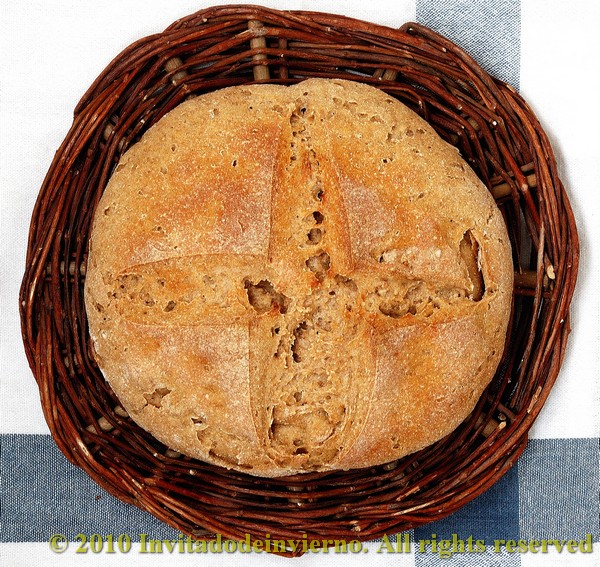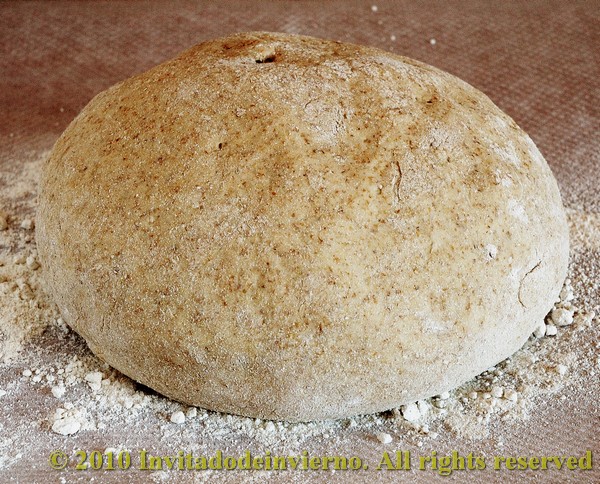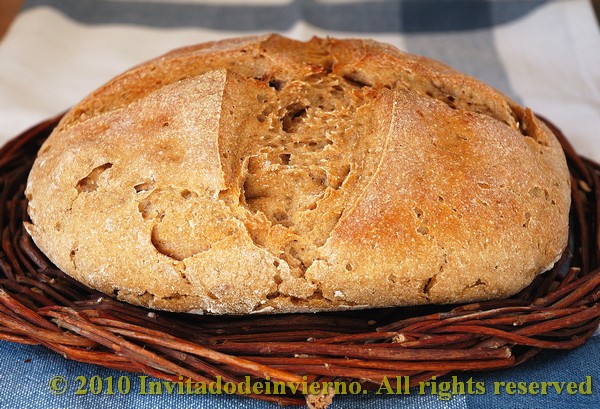100% rye, cider and walnut bread
>> Tuesday, March 9, 2010

I haven't been baking bread lately. My sourdough passed away and my efforts to resuscitate it weren't successful. Maybe it's because of this year's neverending winter and my kitchen being the coldest room in the house. And being that I've become a real bread snob, using commercial yeast doesn't seem an elegant option anymore... it would be sooo totally unlike me... ahem. The thing is that I should already be feeding a new sourdough, but the mere thought of it makes me very lazy... However I recently found this recipe and I couldn't resist making it with commercial baker's yeast (yikes!), even renouncing my principles. Let's roll in the mud.
Mr. Lepard man publishes a new recipe every weekend in the British newspaper The Guardian. His recipes are always original; I love them. This recipe was published last February 6th and it caught my eye for various reasons: the first is that it's a 100% rye bread, which I love, the second is that includes cider, and the third is that the baking starts in a cold oven. I wanted to try the cold-oven-thing. I guess that as rye breads hardly exhibit any oven spring, a high start temperature is not as critical as for wheat breads, which need a sudden increase in ambient temperature to rise properly. To spice up the bread a bit, I added a large handful of walnuts, a good match with rye.
100% rye, cider and walnut bread adapted from Dan Lepard
Preferment:
Dough:
Use organic flour if possible, with germ.

The result is fantastic. A soft bread with a very pleasant cider aroma. The crust could have been a bit crispier, but this way the bread is easier to cut. Sometimes you really have to wrestle with rye breads in order to cut them. This is not the case: Mr. Lepard man, you got it right as usual.
And after a long time, this one goes to Susan's Yeastspotting!
















13 comentarios:
Looks fab. I love rye bread, but mine always seems to come out like a brick!
That is a REALLY interesting recipe. I've always mixed rye with other flours (maybe I haven't had the nerve to go 100% rye!) But this doesn't look too dense at all - just right. I have to try this, and check out this Mr. Lepard man for sure.
I can imagine the wonderful aromas coming from your kitchen Miriam.
What a great looking loaf! My grandmother used to always bake rye bread, and I think I might have to give it a try soon. Thanks for sharing this!
This truly looks like a fabulous bread! And interesting recipe indeed...
I love rye bread and walnuts and this recipe combines both in a delicious bread! Thanks for sharing it.
What a gorgeous bread! Sounds terrific with cider and walnuts!
That rye loaf is a beauty.
When you are ready you'll get a new starter. What a great opportunity to try making a new one using a new method!!
Miriam
Your bread brought to mind my dentist's admonition: eat rye bread, it is the only healthy one to eat~
Well, this one looks beautiful too and the walnuts~ my, with a chunk of cheese, who needs anything else?
This sounds like a really interesting combination of flavors. I love the idea of cider in bread!
Your bread looks wonderful. I can't keep a house plant alive let alone a sour dough starter! I'm a bit intrigued by the 100% rye. Since I am not much of a baker my knowledge is limited but I was always under the impression that rye flour was too dense or heavy to be used alone. Apparently I am more limited than I thought!
Miriam - congratulations on a beautiful loaf. One question though (and from a very inexpert baker, so it could well be idiotic) as I'd love to give your recipe a bash: most of the readily-available ciders in America whether they be local, French or English, are carbonated, and (as far as I know) most Spanish ciders are not. Might the carbonation affect the yeast? Or is it more a case of try it and see what happens?
Janice: I know that... but it shouldn't happen, as long as you let it rise properly.
Trix: well, it's always denser than a mixed loaf, but it was very soft.
Val: yes!
Sophia: thank you!
Simone: thanks!
HGF: hope you try it!
5SF: thanks!
Ben: jiji. Anímate porque es muy divertido.
Mimi: thanks!!
TOB: I agree with him! You know there are some nutritionists which recommend to avoid wheat. And yes, it was delicious with cheese!
Joanne: the smell was wonderful.
Danielle: haha, I can't keep a house plant alive either and I usually manage to keep a starter.
Jonny: I have actually made bread with carbonated cider and I didn't notice anything wrong regarding rising. Only that the Spanish carbonated cider is quite sweet and the crust of the bread browned a bit too much, I guess because of the cider sugars. But I think you can use it!
Post a Comment